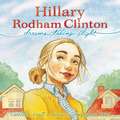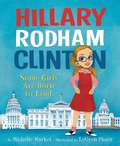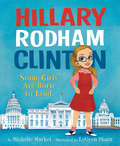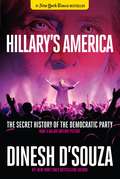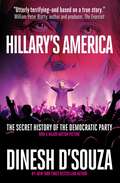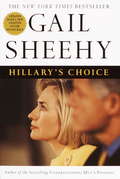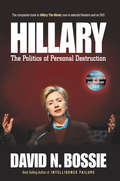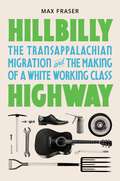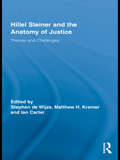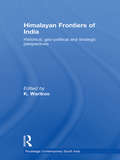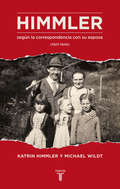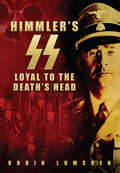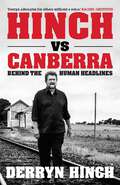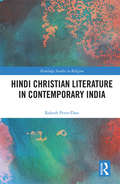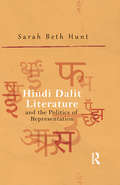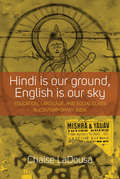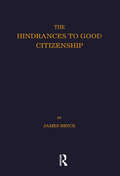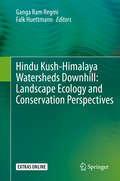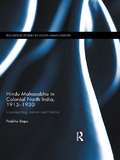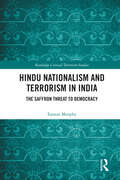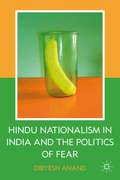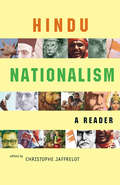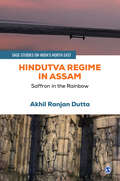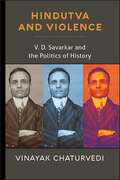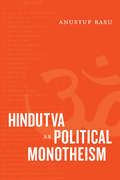- Table View
- List View
Hillary Rodham Clinton: Dreams Taking Flight
by Kathleen KrullThis very first picture book about Senator Hillary Clinton chronicles her life from her childhood in Chicago to serving as the nation's First Lady to her own campaign for President of the United States.
Hillary Rodham Clinton: Some Girls Are Born To Lead
by Michelle Markel LeUyen PhamIn the spirit of Barack Obama: Son of Promise, Child of Hope and Amelia and Eleanor Go for a Ride comes an inspiring portrait of Hillary Rodham Clinton, the first female presidential nominee in United States history: a girl who fought to make a difference—and paved the way for women everywhere—from Michelle Markel and LeUyen Pham. <P><P> In the 1950s, it was a man’s world. Girls weren’t supposed to act smart, tough, or ambitious. Even though, deep inside, they may have felt that way. And then along came Hillary. Brave, brilliant, and unstoppable, she was out to change the world. <P><P> They said a woman couldn’t be a mother and a lawyer. Hillary was both. They said a woman shouldn’t be too strong or too smart. Hillary was fearlessly herself. <P><P> It didn’t matter what people said—she was born to lead. <P><P> With illustrations packed full of historical figures and details, this gorgeous and informative picture book biography is perfect for every budding leader. Includes a timeline, artist’s note, and bibliography.
Hillary Rodham Clinton: Some Girls Are Born to Lead
by Michelle MarkelIn the spirit of Barack Obama: Son of Promise, Child of Hope and Amelia and Eleanor Go for a Ride comes an inspiring portrait of Hillary Rodham Clinton, the first female presidential nominee in United States history: a girl who fought to make a difference—and paved the way for women everywhere—from Michelle Markel and LeUyen Pham. This nonfiction picture book is an excellent choice to share during homeschooling, in particular for children ages 4 to 6. It’s a fun way to learn to read and as a supplement for activity books for children.In the 1950s, it was a man’s world. Girls weren’t supposed to act smart, tough, or ambitious. Even though, deep inside, they may have felt that way. And then along came Hillary. Brave, brilliant, and unstoppable, she was out to change the world.They said a woman couldn’t be a mother and a lawyer. Hillary was both. They said a woman shouldn’t be too strong or too smart. Hillary was fearlessly herself.It didn’t matter what people said—she was born to lead.With illustrations packed full of historical figures and details, this gorgeous and informative picture book biography is perfect for every budding leader. Includes a timeline, artist’s note, and bibliography.
Hillary's America: The Secret History Of The Democratic Party
by Dinesh D'SouzaDinesh D’Souza, author of the #1 New York Times bestseller America: Imagine a World Without Her, has a warning: We are on the brink of losing our country forever. After eight years of Obama, four years—or possibly eight years—of Hillary Clinton as president of the United States would so utterly transform America as to make it unrecognizable. <P><P> No more will America be a land of opportunity. Instead, it will be a land of rapacious crony capitalism, run solely for the benefit of friends of the Obamas and the Clintons and the Democratic Party. It will, in fact, be the fulfillment of a dream the Democratic Party has had from the beginning…a dream of stealing America for the politically favored few.<P> In Hillary's America, D’Souza reveals the sordid truth about Hillary and the secret history of the Democratic Party, including: how Democrats transitioned from pro-slavery to pro-enslavement; the long-standing Democratic political war against women; how Hillary Clinton’s political mentor was, literally, a cold-blooded gangster; how the Clintons and other Democrats see foreign policy not in terms of national interest, but in terms of personal profit; how Democratically controlled cities have turned into hotbeds of crime and corruption; and much, much more.<P> Not only is Hillary Clinton a liar and a criminal—who would have been indicted for mishandling classified information on her secret email sever had the Democratic Party not closed ranks around her—she is also the culmination of her party's deliberate and stunning plot to redistribute wealth and political power to the liberal elite.<P> Find out how Hillary and Bill used the Clinton Foundation to ruthlessly sell State Department influence to the highest foreign bidder. Find out what shady backroom Democrat dealers taught Hillary Clinton her particular brand of corrupt party politics. And most importantly, find out whether America can stop her from destroying the country once and for all. <P><b>A New York Times Bestseller</b>
Hillary's America: The Secret History of the Democratic Party
by Dinesh D'SouzaDinesh D’Souza has a warning: We are on the brink of losing our country forever. After eight years of Obama, four years-or possibly eight years-of Hillary Clinton as president of the United States would so utterly transform America as to make it unrecognizable.No more will America be a land of opportunity. Instead, it will be a land of rapacious crony capitalism, run solely for the benefit of friends of the Obamas and the Clintons and the Democratic Party. It will, in fact, be the fulfillment of a dream the Democratic Party has had from the beginning...a dream of stealing America for the politically favored few. <p><p> In Hillary's America, D’Souza reveals the sordid truth about Hillary and the secret history of the Democratic Party, including: how Democrats transitioned from pro-slavery to pro-enslavement; the long-standing Democratic political war against women; how Hillary Clinton’s political mentor was, literally, a cold-blooded gangster; how the Clintons and other Democrats see foreign policy not in terms of national interest, but in terms of personal profit; how Democratically controlled cities have turned into hotbeds of crime and corruption; and much, much more. <p> Not only is Hillary Clinton a liar and a criminal-who would have been indicted for mishandling classified information on her secret email sever had the Democratic Party not closed ranks around her-she is also the culmination of her party's deliberate and stunning plot to redistribute wealth and political power to the liberal elite. <p> Find out how Hillary and Bill used the Clinton Foundation to ruthlessly sell State Department influence to the highest foreign bidder. Find out what shady backroom Democrat dealers taught Hillary Clinton her particular brand of corrupt party politics. And most importantly, find out whether America can stop her from destroying the country once and for all.
Hillary's Choice
by Gail SheehyA fascinating portrait of the most intriguing lady in America - The First Lady - by the bestselling author who has revealed more about her than any other. In a real sense,Hillary's Choiceis a love story - one whose rocky moments, rather than remaining private, have been publicized beyond any imagining. What is the real story of the marriage of Bill and Hillary Rodham Clinton? Gail Sheehy began to discover it seven years ago, when she wrote the first revealing piece about Hillary. Since then, she has followed and recorded this relationship as only she can. Hillary's Choicetakes the Clintons from the moment their eyes met in law school through the humiliation of the Lewinsky affair and the drama of the impeachment battle to reveal the power shifts, the genuine passion, and the ultimate price Hillary has paid for her love and her ambition. Combined with in-depth reporting, Gail Sheehy has brought an acute understanding to the private dynamic of a very public an political partnership.
Hillary: The Politics of Personal Destruction
by David BossieIt's not a stretch to say that more has been written about Hillary, pro and con, than probably any other living American politician. So in the build-up to the 2008 presidential election, what is not needed is just another book about Candidate Hillary. Fortunately, this exposé is much more-a hybrid product that includes not only cutting-edge reporting, revealing facts and fictions about the junior senator from New York, but does it in a dual book-and-movie format. David N. Bossie, former chief investigator for the US House of Representatives Committee on Government Reform and Oversight, reveals all the must-know details about Hillary's life and career, exposing the truth about her conflicts in the past and her liberal plot for the future. Bossie has previously produced such acclaimed documentaries as Border War(www.borderwarmovie.com).
Hillbilly Highway: The Transappalachian Migration and the Making of a White Working Class (Politics and Society in Modern America #157)
by Max Fraser&“The best book to explain the world J. D. Vance came from is Max Fraser&’s Hillbilly Highway.&”—Jessica Wilkerson, author of To Live Here, You Have to Fight: How Women Led Appalachian Movements for Social JusticeOver the first two-thirds of the twentieth century, as many as eight million whites left the economically depressed southern countryside and migrated to the booming factory towns and cities of the industrial Midwest in search of work. The "hillbilly highway" was one of the largest internal relocations of poor and working people in American history, yet it has largely escaped close study by historians. In Hillbilly Highway, Max Fraser recovers the long-overlooked story of this massive demographic event and reveals how it has profoundly influenced American history and culture—from the modern industrial labor movement and the postwar urban crisis to the rise of today&’s white working-class conservatives.The book draws on a diverse range of sources—from government reports, industry archives, and union records to novels, memoirs, oral histories, and country music—to narrate the distinctive class experience that unfolded across the Transappalachian migration during these critical decades. As the migration became a terrain of both social advancement and marginalization, it knit together white working-class communities across the Upper South and the Midwest—bringing into being a new cultural region that remains a contested battleground in American politics to the present.The compelling story of an important and neglected chapter in American history, Hillbilly Highway upends conventional wisdom about the enduring political and cultural consequences of the great migration of white southerners in the twentieth century.
Hillel Steiner and the Anatomy of Justice: Themes and Challenges (Routledge Studies in Contemporary Philosophy)
by Ian Carter Stephen De Wijze Matthew H. KramerThroughout the English-speaking world, and in the many other countries where analytic philosophy is studied, Hillel Steiner is esteemed as one of the foremost contemporary political philosophers. This volume is designed as a festschrift for Steiner and as an important collection of philosophical essays in its own right. The editors have assembled a roster of highly distinguished international contributors, all of whom are eager to pay tribute to Steiner by focusing on topics on which he himself has concentrated. Some of the contributors engage directly with Steiner's work, whereas others focus not directly on his writings but instead grapple with issues that have figured prominently therein. Each essay seeks to advance the debates in which Steiner himself has so notably participated. The study concludes with a response by Steiner himself.
Himalayan Frontiers of India: Historical, Geo-Political and Strategic Perspectives (Routledge Contemporary South Asia Series)
by K. WarikooThe Himalaya, which is a great natural frontier for India, symbolises India’s spiritual and national consciousness. The Himalayan region displays wide diversity of cultural patterns, languages, ethnic identities and religious practices. Along the Himalayas converge the boundaries of South and Central Asian countries, which lend a unique geopolitical and geo-strategic importance to this region. This book provides a comprehensive analysis of historical, geo-political and strategic perspectives on the Himalayan Frontiers of India. Drawing on detailed analyses by academics and area specialists, it explains the developments in and across the Himalayas and their implications for India. Topics such as religious extremism, international and cross border terrorism, insurgency, drugs and arms trafficking are discussed by experts in their respective field. Himalayan Frontiers of India will be of interest to scholars in South and Central Asian studies, International Relations and Security Studies.
Himmler según la correspondencia con su esposa (1927-1945)
by Michael Himmler Katrin WildtEl retrato íntimo de Heinrich Himmler, funesto jefe de las SS y padre de la Solución Final, a través de las cartas con su mujer.Durante años se pensó que las cartas de Himmler a su esposa Marga se habían perdido definitivamente. Sesenta años después del suicidio de éste, reaparecieron en Tel Aviv, y hoy nos permiten sumergirnos de una forma inédita en la vida privada, y en la mente, de una de las figuras más importantes del régimen nazi. Frente a la idea generalizada de que, tras su nombramiento como Reichsführer SS, Heinrich Himmler se «fundió» sin más en la organización, sus cartas revelan su estrecha relación con Hitler desde los años veinte y confirman que era el gran ideador de la Solución Final.El que fue uno de los mayores criminales del siglo XX era un hombre que se debatía entre la banalidad y la vanidad, entre la distancia y la cercanía con su familia, preocupado por construirse una esfera privada armoniosa al tiempo que organizaba, de manera cotidiana, la persecución y el exterminio en masa.En su última carta, del 17 de abril de 1945, Himmler se despide con un «Heil Hitler! Con amor, vuestro papi». Por aquellos días, a espaldas del Fürher, se esforzaba por negociar secretamente con los aliados. Unos días más tarde, el 22 de mayo, ingirió una cápsula de cianuro que le permitió eludir su comparecencia ante los vencedores.
Himmler's SS: Loyal to the Death's Head
by Robin LumsdenThe real story of the SS, unlike its popular mythology, is so complex as to almost defy belief: it is a tale of intrigue and nepotism, of archaeology and Teutonism, of art and symbolism.Himmler's SS is a story of street fighters and convicted criminals becoming Ministers of State and police commanders; the story of charitable works and mass extermination being administered from the same building; the story of boy generals directing vast heterogeneous armies on devastating campaigns of conquest. Here, indeed, fact is stranger than fiction. Himmler's SS looks at the wide-ranging effects that the SS had on the Police, racial policies, German history, education, the economy and public life, as well as the uniforms and regalia which were carefully designed to set Himmler's men apart as the new elite in Third Reich society. Fully illustrated, this book is an authoritative history of the SS and as such will appeal to all with an interest in Hitler's Third Reich.
Hinch vs Canberra: Behind the human headline
by Derryn HinchAs a current affairs commentator, Derryn Hinch spent decades fighting with politicians. Then the unthinkable happened he became one. This is the inside story of Senator Hinch's first year in Canberra. Explosive, incisive, frank, brutal, and, at times, very funny.
Hindi Christian Literature in Contemporary India (Routledge Studies in Religion)
by Rakesh Peter-DassThis is the first academic study of Christian literature in Hindi and its role in the politics of language and religion in contemporary India. In public portrayals, Hindi has been the language of Hindus and Urdu the language of Muslims, but Christians have been usually been associated with the English of the foreign ‘West’. However, this book shows how Christian writers in India have adopted Hindi in order to promote a form of Christianity that can be seen as Indian, desī, and rooted in the religio-linguistic world of the Hindi belt. Using three case studies, the book demonstrates how Hindi Christian writing strategically presents Christianity as linguistically Hindi, culturally Indian, and theologically informed by other faiths. These works are written to sway public perceptions by promoting particular forms of citizenship in the context of fostering the use of Hindi. Examining the content and context of Christian attention to Hindi, it is shown to have been deployed as a political and cultural tool by Christians in India. This book gives an important insight into the link between language and religion in India. As such, it will be of great interest to scholars of Religion in India, World Christianity, Religion and Politics and Interreligious Dialogue, as well as Religious Studies and South Asian Studies.
Hindi Dalit Literature and the Politics of Representation
by Sarah Beth HuntThis study explores how Dalits in north India have used literature as a means of protest against caste oppression. Including fresh ethnographic research and interviews, it traces the trajectory of modern Dalit writing in Hindi and its pivotal role in the creation, rise and reinforcement of a distinctive Dalit identity. The book challenges the existing impression of Hindi Dalit literature as stemming from the Dalit political assertion of the 1980s and as being chiefly imitative of the Marathi Dalit literature model. Arguing that Hindi Dalit literature has a much longer history in north India, it examines two differing strands that have taken root in Dalit expression — the early ‘popular’ production of smaller literary pamphlets and journals at the beginning of the 20th century and more contemporary modes such as autobiographies, short stories and literary criticism. The author highlights the ways in which such various forms of literary works have supported the proliferation of an all-encompassing identity for the so-called ‘untouchable’ castes. She also underscores how these have contributed to their evolving political consciousness and consolidation of newer heterogeneous identities, making a departure from their long-perceived image. The work will be important for those in Dalit studies, subaltern history, Hindi literature, postcolonial studies, political science and sociology as well as the informed general reader.
Hindi Is Our Ground, English Is Our Sky: Education, Language, and Social Class in Contemporary India
by Chaise LadousaA sea change has occurred in the Indian economy in the last three decades, spurring the desire to learn English. Most scholars and media venues have focused on English exclusively for its ties to processes of globalization and the rise of new employment opportunities. The pursuit of class mobility, however, involves Hindi as much as English in the vast Hindi-Belt of northern India. Schools are institutions on which class mobility depends, and they are divided by Hindi and English in the rubric of "medium," the primary language of pedagogy. This book demonstrates that the school division allows for different visions of what it means to belong to the nation and what is central and peripheral in the nation. It also shows how the language-medium division reverberates unevenly and unequally through the nation, and that schools illustrate the tensions brought on by economic liberalization and middle-class status.
Hindrances to Good Citizenship
by James BryceFirst published in 1909. Historian, jurist, diplomat, and member of Parliament, James Bryce (1838-1922) lived one of those remarkably full and fruitful nineteenth-century public lives that remain a wonder today. He served as ambassador to the United States from 1907 to 1913 and was one of the most knowledgeable, perceptive, and sympathetic interpreters of American civilization. This is a collection of his Yale lectures.
Hindu Kush-Himalaya Watersheds Downhill: Landscape Ecology and Conservation Perspectives
by Falk Huettmann Ganga Ram RegmiThis book describes the myriad components of the Hindu Kush-Himalaya (HKH) region. The contributors elaborate on challenges, failures, and successes in efforts to conserve the HKH, its indigenous plants and animals, and the watershed that runs from the very roof of the planet via world-rivers to marine estuaries, supporting a human population of some two billion people. Readers will learn how the landforms, animal species and humans of this globally fascinating region are connected, and understand why runoff from snow and ice in the world’s tallest mountains is vital to inhabitants far downstream. The book comprises forty-five chapters organized in five parts. The first section, Landscapes, introduces the mountainous watersheds of the HKH, its weather systems, forests, and the 18 major rivers whose headwaters are here. The second part explores concepts, cultures, and religions, including ethnobiology and indigenous regimes, two thousand years of religious tradition, and the history of scientific and research expeditions. Part Three discusses policy, wildlife conservation management, habitat and biodiversity data, as well as the interaction of animals and humans. The fourth part examines the consequences of development and globalization, from hydrodams, to roads and railroads, to poaching and illegal wildlife trade. This section includes studies of animal species including river dolphins, woodpeckers and hornbills, langurs, snow leopards and more. The concluding section offers perspectives and templates for conservation, sustainability and stability in the HKH, including citizen-science projects and a future challenged by climate change, growing human population, and global conservation decay. A large assemblage of field and landscape photos, combined with eye-witness accounts, presents a 50-year local and wider perspective on the HKH. Also included are advanced digital topics: data sharing, open access, metadata, web portal databases, geographic information systems (GIS) software and machine learning, and data mining concepts all relevant to a modern scientific understanding and sustainable management of the Hindu Kush-Himalaya region. This work is written for scholars, landscape ecologists, naturalists and researchers alike, and it can be especially well-suited for those readers who want to learn in a more holistic fashion about the latest conservation issues.
Hindu Mahasabha in Colonial North India, 1915-1930: Constructing Nation and History (Routledge Studies in South Asian History)
by Prabhu BapuHindu nationalism has emerged as a political ideology represented by the Hindu Mahasabha. This book explores the campaign for Hindu unity and organisation in the context of the Hindu-Muslim conflict in colonial north India in the early twentieth century. It argues that India's partition in 1947 was a result of the campaign and politics of the Hindu rightwing rather than the Islamist politics of the Muslim League alone. The book explains that the Mahasabha articulated Hindu nationalist ideology as a means of constructing a distinct Hindu political identity and unity among the Hindus in conflict with the Muslims in the country. It looks at the Mahasabha’s ambivalence with the Indian National Congress due to an extreme ideological opposition, and goes on to argue that the Mahasabha had its ideological focus on an anti-Muslim antagonism rather than the anti-British struggle for India’s independence, adding to the difficulties in the negotiations on Hindu-Muslim representation in the country. The book suggests that the Mahasabha had a limited class and regional base and was unable to generate much in the way of a mass movement of its own, but developed a quasi-military wing, besides its involvement in a number of popular campaigns. Bridging the gap in Indian historiography by focusing on the development and evolution of Hindu nationalism in its formative period, this book is a useful study for students and scholars of Asian Studies and Political History.
Hindu Nationalism and Terrorism in India: The Saffron Threat to Democracy (Routledge Critical Terrorism Studies)
by Eamon MurphyThis book discusses terrorism and the rise of Hindu nationalism in contemporary India and examines how this movement has become a threat to democracy in the country. The work analyses the rise of Hindu nationalism, culminating in the success of Narendra Modi’s Bharatiya Janata Party (BJP), the political arm of the movement, in the 2019 Indian national elections. It offers an accessible account of the complexities and subtleties of Hindu nationalism and the dangers it poses to India’s pluralistic democracy and secularism. A major theme of the book is the role that terrorism has played in the rise of Hindu nationalism, a factor often underplayed or ignored in other studies, and it also challenges the widespread belief that terrorism is largely an Islamic phenomenon. Employing a cross-disciplinary approach, the book is highly relevant to both academics and policymakers, given India’s importance as a major global economic and military power. This book will be of interest to students of terrorism and political violence, South Asian history, Indian politics and international relations, as well as policymakers.
Hindu Nationalism in India and the Politics of Fear
by Dibyesh AnandThe representation of the Muslims as threatening to India's body politic is central to the Hindu nationalist project of organizing a political movement and normalizing anti-minority violence. Adopting a critical ethnographic approach, this book identifies the poetics and politics of fear and violence engendered within Hindu nationalism.
Hindu Nationalism: A Reader
by Christophe JaffrelotHindu nationalism came to world attention in 1998, when the Hindu nationalist Bharatiya Janata Party (BJP) won national elections in India. Although the BJP was defeated nationally in 2004, it continues to govern large Indian states, and the movement it represents remains a major force in the world's largest democracy. This book presents the thought of the founding fathers and key intellectual leaders of Hindu nationalism from the time of the British Raj, through the independence period, to the present. Spanning more than 130 years of Indian history and including the writings of both famous and unknown ideologues, this reader reveals how the "Hindutuva" movement approaches key issues of Indian politics. Covering such important topics as secularism, religious conversion, relations with Muslims, education, and Hindu identity in the growing diaspora, this reader will be indispensable for anyone wishing to understand contemporary Indian politics, society, culture, or history.
Hindutva Regime in Assam: Saffron in the Rainbow (SAGE Studies on India′s North East)
by Akhil Ranjan DuttaHindutva Regime in Assam: Saffron in the Rainbow analyses the Bharatiya Janata Party’s (BJP) strategy of appropriating cultural resources in Assam while pursuing the Hindutva agenda. In Assam, where numerous ethnic and regional political outfits have registered their electoral presence, the ‘Rainbow Alliance’ emerged as the dominant strategic tool for BJP in its electoral battles. The book studies how BJP has capitalized on people’s attachment to their ethno-regional cultures and has successfully co-opted and ‘saffronized’ the ‘Rainbow’ by bringing together diverse ethnic groups into its fold. Scrutinizing electoral strategies, BJP’s victories in 2014, 2016 and 2019, and the efforts towards dismantling consensus around the National Register of Citizens (NRC) by enacting the Citizenship Amendment Act (CAA), the book provides a holistic view of this steady ‘saffronization’. It also critically investigates BJP’s populist development agenda. From the Rashtriya Swayamsevak Sangh’s (RSS) grassroots work to the government’s policy initiatives, the book analyses the regime’s performance and ideological pursuits in depth. It highlights how BJP’s strategies in Assam are unique in some ways and how similar strategies can be seen elsewhere in India.
Hindutva and Violence: V. D. Savarkar and the Politics of History
by Vinayak ChaturvediExamines the place of history in the political thought of Vinayak Damodar Savarkar, one of the key architects of modern Hindu nationalism.Hindutva and Violence explores the place of history in the political thought of Vinayak Damodar Savarkar (1883–1966), the most controversial Indian political thinker of the twentieth century and a key architect of Hindu nationalism. Examining his central claim that "Hindutva is not a word but a history," the book argues that, for Savarkar, this history was not a total history, a complete history, or a narrative history. Rather, its purpose was to trace key historical events to a powerful source-the font of motivation for "chief actors" of the past who had turned to violence in a permanent war for Hindutva as the founding principle of a Hindu nation. At the center of Savarkar's writings are historical characters who not only participated in ethical warfare against invaders, imperialists, and conquerors in India, but also became Hindus in acts of violence. He argues that the discipline of history provides the only method for interpreting Hindutva.The book also shows how Savarkar developed his conceptualization of history as a way into the meaning of Hindutva. Savarkar wrote extensively, from analyses of the nineteenth century to studies of antiquity, to draw up his histories of Hindus. He also turned to a wide range of works, from the epic tradition to contemporary social theory and world history, as his way of explicating "Hindutva" and "history." By examining Savarkar's key writings on history, historical methodology, and historiography, Vinayak Chaturvedi provides an interpretation of the philosophical underpinnings of Hindutva. Savarkar's interpretation of Hindutva, he demonstrates, requires above all grappling with his idea of history.
Hindutva as Political Monotheism
by Anustup BasuIn Hindutva as Political Monotheism, Anustup Basu offers a genealogical study of Hindutva—Hindu right-wing nationalism—to illustrate the significance of Western anthropology and political theory to the idea of India as a Hindu nation. Connecting Nazi jurist Carl Schmitt's notion of political theology to traditional theorems of Hindu sovereignty and nationhood, Basu demonstrates how Western and Indian theorists subsumed a vast array of polytheistic, pantheistic, and henotheistic cults featuring millions of gods into a singular edifice of faith. Basu exposes the purported “Hindu Nation” as itself an orientalist vision by analyzing three crucial moments: European anthropologists’ and Indian intellectuals’ invention of a unified Hinduism during the long nineteenth century; Indian ideologues’ adoption of ethnoreligious nationalism in pursuit of a single Hindu way of life in the twentieth century; and the transformations of this project in the era of finance capital, Bollywood, and new media. Arguing that Hindutva aligns with Enlightenment notions of nationalism, Basu foregrounds its significance not just to Narendra Modi's right-wing, anti-Muslim government but also to mainstream Indian nationalism and its credo of secularism and tolerance.
